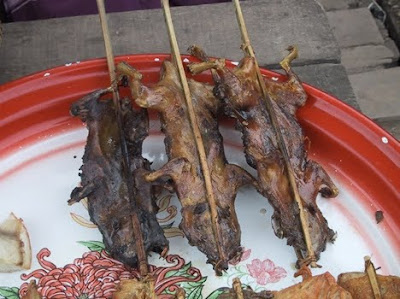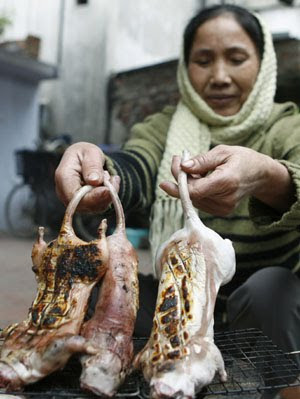- Joined
- Aug 8, 2008
- Messages
- 3,619
- Points
- 0
http://www.todayonline.com/Singapore/EDC101230-0000207/Most-of-the-bak-kwa-eaten-here-made-locally
Most of the bak kwa eaten here made locally
by Neo Chai Chin 05:55 AM Dec 30, 2010
SINGAPORE - Even as bak kwa (barbecued pork) sellers urge the authorities to be on the alert for the smuggling of raw barbecue pork into Singapore, the Agri-food and Veterinary Authority (AVA) said yesterday that most of the bak kwa consumed here is manufactured locally.
Major bak kwa retailers like Lim Chee Guan, Bee Cheng Hiang and Fragrance Foodstuff told MediaCorp they do not import raw bak kwa.
Fragrance Foodstuff managing director Tan Tiong Hwa said the company imports pork from Brazil and Indonesia, from which it makes bak kwa at its factory here.
Mr Tan said he had not personally heard of raw bak kwa being smuggled into Singapore but recalled reading about cases previously reported in the press, and urged vigilance on attempts to smuggle raw barbecue pork into Singapore.
Last Sunday, a man was caught hiding 48kg of raw bak kwa in the spare tyre compartment and side panels of a car, hoping to sneak past Immigration and Checkpoints Authority (ICA) officers at the Woodlands Checkpoint.
The pork was eventually disposed of on the AVA's advice to minimise the risk of introducing infectious animal diseases here.
While statistics for cases of smuggled barbecue pork are not available, the smuggling of AVA-controlled items including animals, flora and meat products is on the rise.
There were 3,900 cases reported in the first half of the year - a 44 per cent increase from the same period last year, according to the ICA.
Countries that are approved by the AVA to export processed pork to Singapore include Australia, Canada, the Netherlands, the United States and China.
Raw bak kwa is currently imported only from China and 330 tonnes of it were imported from January to November - more than twice the 150 tonnes imported last year. Neo Chai Chin
Most of the bak kwa eaten here made locally
by Neo Chai Chin 05:55 AM Dec 30, 2010
SINGAPORE - Even as bak kwa (barbecued pork) sellers urge the authorities to be on the alert for the smuggling of raw barbecue pork into Singapore, the Agri-food and Veterinary Authority (AVA) said yesterday that most of the bak kwa consumed here is manufactured locally.
Major bak kwa retailers like Lim Chee Guan, Bee Cheng Hiang and Fragrance Foodstuff told MediaCorp they do not import raw bak kwa.
Fragrance Foodstuff managing director Tan Tiong Hwa said the company imports pork from Brazil and Indonesia, from which it makes bak kwa at its factory here.
Mr Tan said he had not personally heard of raw bak kwa being smuggled into Singapore but recalled reading about cases previously reported in the press, and urged vigilance on attempts to smuggle raw barbecue pork into Singapore.
Last Sunday, a man was caught hiding 48kg of raw bak kwa in the spare tyre compartment and side panels of a car, hoping to sneak past Immigration and Checkpoints Authority (ICA) officers at the Woodlands Checkpoint.
The pork was eventually disposed of on the AVA's advice to minimise the risk of introducing infectious animal diseases here.
While statistics for cases of smuggled barbecue pork are not available, the smuggling of AVA-controlled items including animals, flora and meat products is on the rise.
There were 3,900 cases reported in the first half of the year - a 44 per cent increase from the same period last year, according to the ICA.
Countries that are approved by the AVA to export processed pork to Singapore include Australia, Canada, the Netherlands, the United States and China.
Raw bak kwa is currently imported only from China and 330 tonnes of it were imported from January to November - more than twice the 150 tonnes imported last year. Neo Chai Chin









